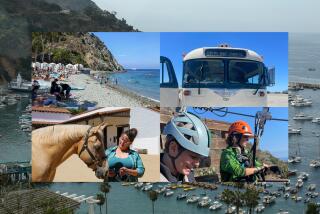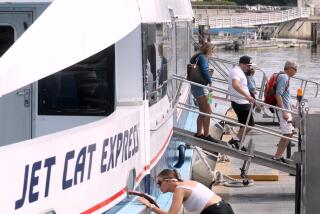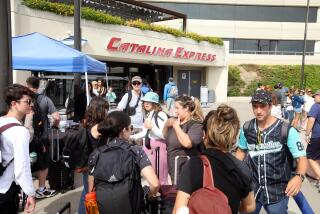On Catalina Island, concern yet calm as coronavirus threatens tourism economy
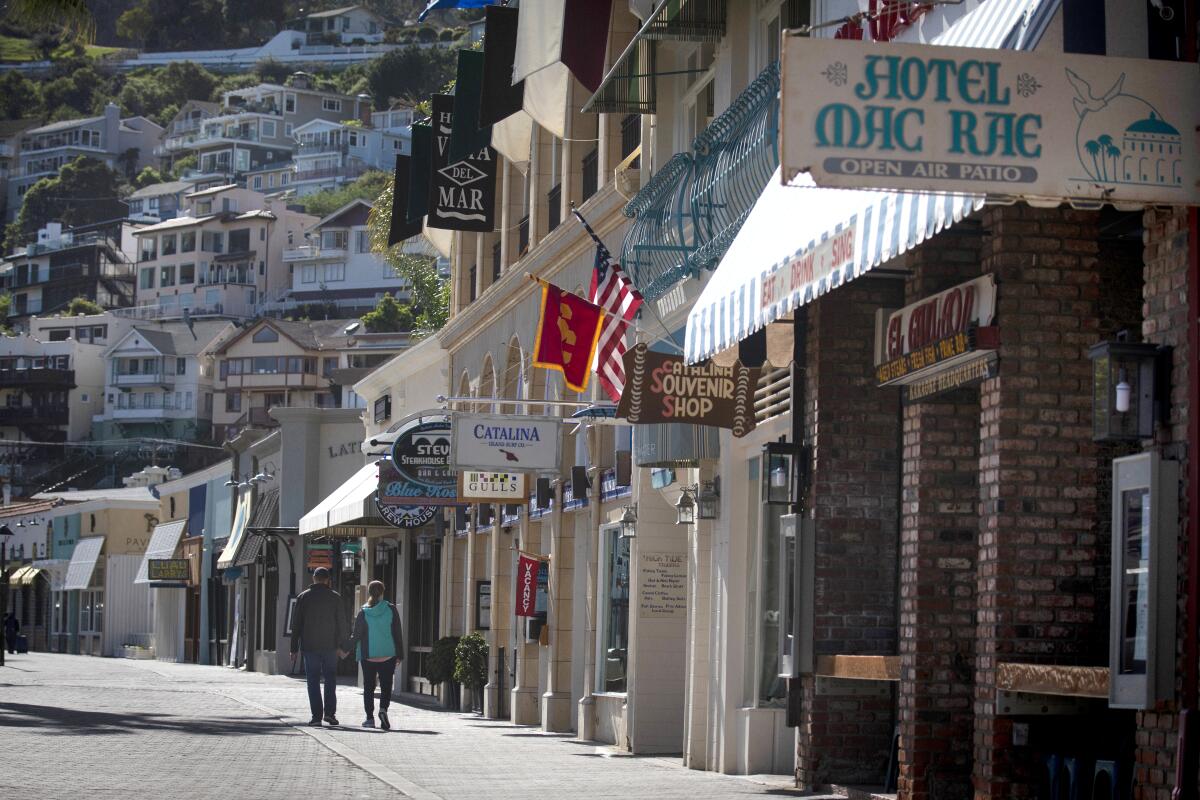
- Share via
On a typical Monday afternoon, Don Whitaker sees all 30 of his golf carts rented out to tourists who putter around on them across the city of Avalon in Catalina.
“Right now, it would be like Disneyland without rides,” said Whitaker as the 70-year-old leaned back in one of his comfy carts and took in the beauty of Avalon Bay.
This Monday , his entire fleet stayed put.
The cruise ships that drop off thousands every Monday and Tuesday throughout the year on the Island of Romance were staying away until at least the end of April because of the threat of coronavirus.
No one was playing in the basketball or beach volleyball courts in front of Whitaker’s business, Island Rentals. Only one family romped around in the playpen. Lonely boats bobbed in the bay.
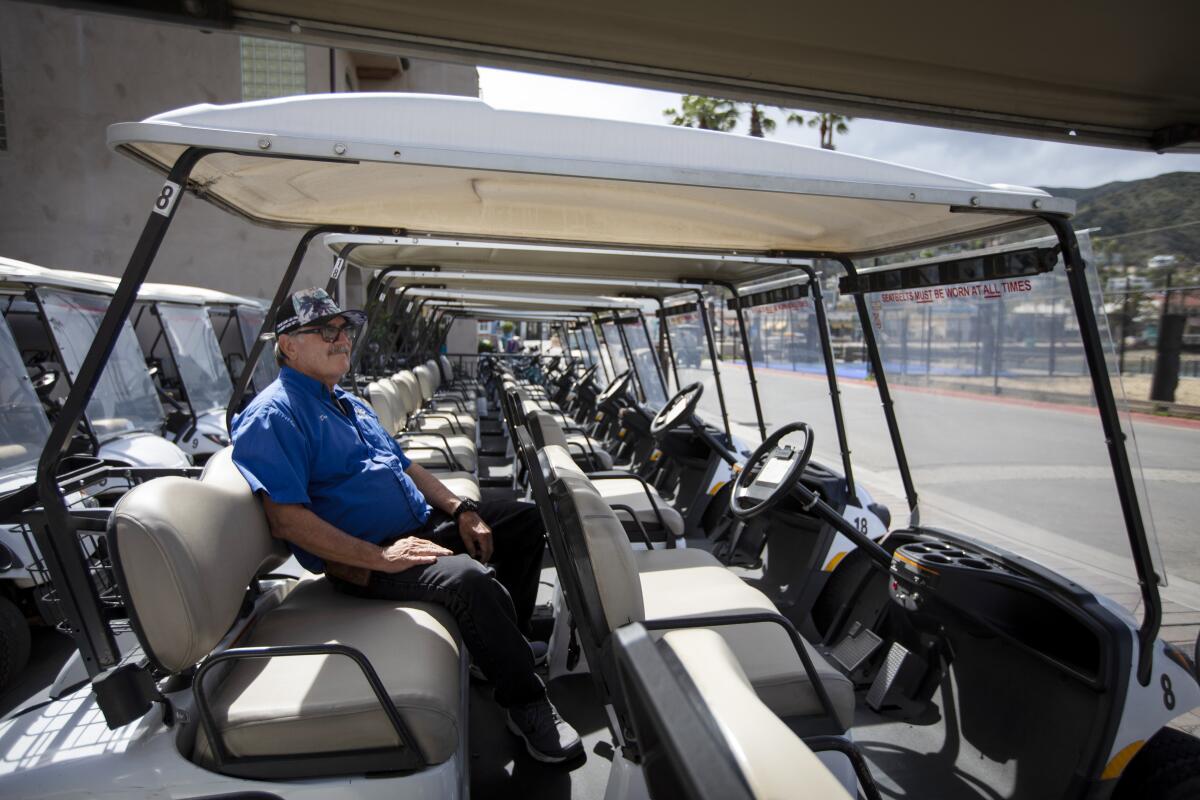
From a distance, Whitaker could see that downtown Avalon was almost empty.
The busy season was supposed to begin this week in Catalina, where the economy is wholly dependent on visitors. Instead, the island is already feeling the effects of a nationwide call by local, state and federal leaders to stay home for at least two weeks to lessen the spread of COVID-19.
The Catalina Express and Catalina Flyer ferries that serve as the lifeline between Avalon and the rest of Southern California were nowhere near as packed as they usually were.
“I’ve never seen it this bad,” said Gloria Jimenez, 46, who worked the counter at Ellie’s Island Deli, the first gift shop passengers see when they step off the boats. “And we’re just beginning.”
Husband and wife Randy Brannock and Mary Stein, who run Catalina Island Expeditions, tried to enjoy their regular morning coffee with friends outside Catalina Island Brew House but couldn’t: They had just laid off their crew.
“Everybody’s in bad shape,” Brannock said. Stein added, “I would hope that healthy people would still come here,” while acknowledging they probably wouldn’t right now.
Islanders were resigned to one of the biggest economic hits of their lifetime. But they also offered perspective.
Relative isolation from the rest of Southern California has long toughened Avalonians to the whims of disasters — long droughts, the loss of its status as Hollywood’s playground, and epic fires that destroyed most of Avalon in 1915 and prompted a mass evacuation in 2007.
“There’s this worry about what’s next,” Whitaker said as a half-full tourist truck rumbled off to Catalina’s backcountry. “But we’ll get through it.”
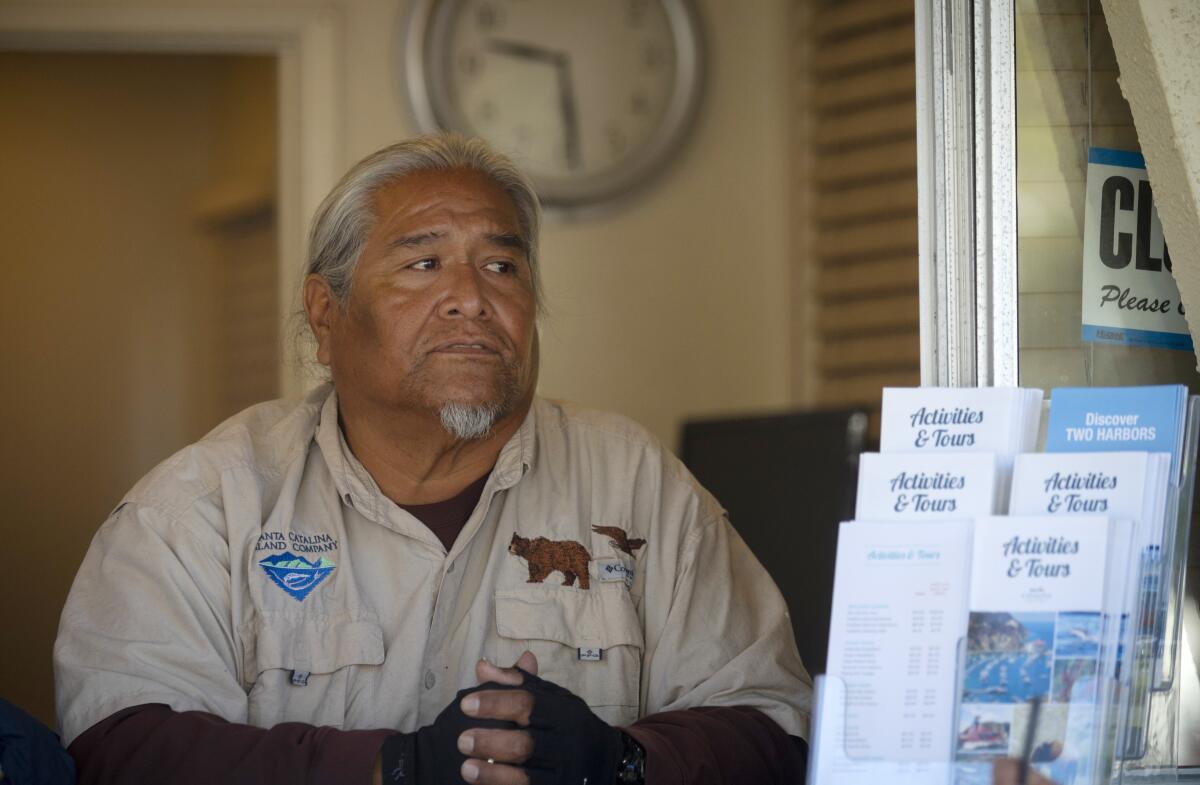
“When we’re this small, we take care of each other,” said Bear Opah, a guide for Catalina Island Co., from a ticket booth. His 11 a.m. nature tour, usually filled, had only five reservations.
“We’re all going to lose,” said co-worker Pamela Ibarra as she sold miniature-golf tickets to a couple from San Diego, “but we’re all going to eventually win.”
Discussions among Catalina officials, L.A. County and the Center for Diseases Control and Prevention about how to take on the specter of coronavirus have gone on for weeks. There have been no reported cases here, but the very lifeblood that powers the Catalina economy — tourists — is also the likeliest way for the disease to arrive.
“We’re an island with limited capabilities to address something like it,” Assistant City Manager Michael Parmer said.
He said talks with Carnival Cruise Line, the main line that visits Catalina, were going on well before President Trump asked the industry for a 30-day moratorium on all cruises to the United States. Avalon requested they not return until at least April 30, Parmer said, “for an overabundance of caution.”
“Our heaviest burden is to balance the economic viability of the island with the well-being of everyone,” said Councilwoman Cinde MacGugan-Cassidy outside her family’s hardware store. Cruise ships passengers alone spend an estimated $23 million a year, according to the Catalina Chamber of Commerce . “If that means taking a break [from cruises], then that has to be it.”
On Catalina’s first day under its self-imposed economic quarantine, island life seemed as bucolic as usual, even as year-rounders kept one another abreast of the ever-changing news. The local Vons — one of the highest grossing in Southern California — was out of toilet paper, hand sanitizer and bleach just like on the mainland, but store clerks assured customers a new shipment had arrived.
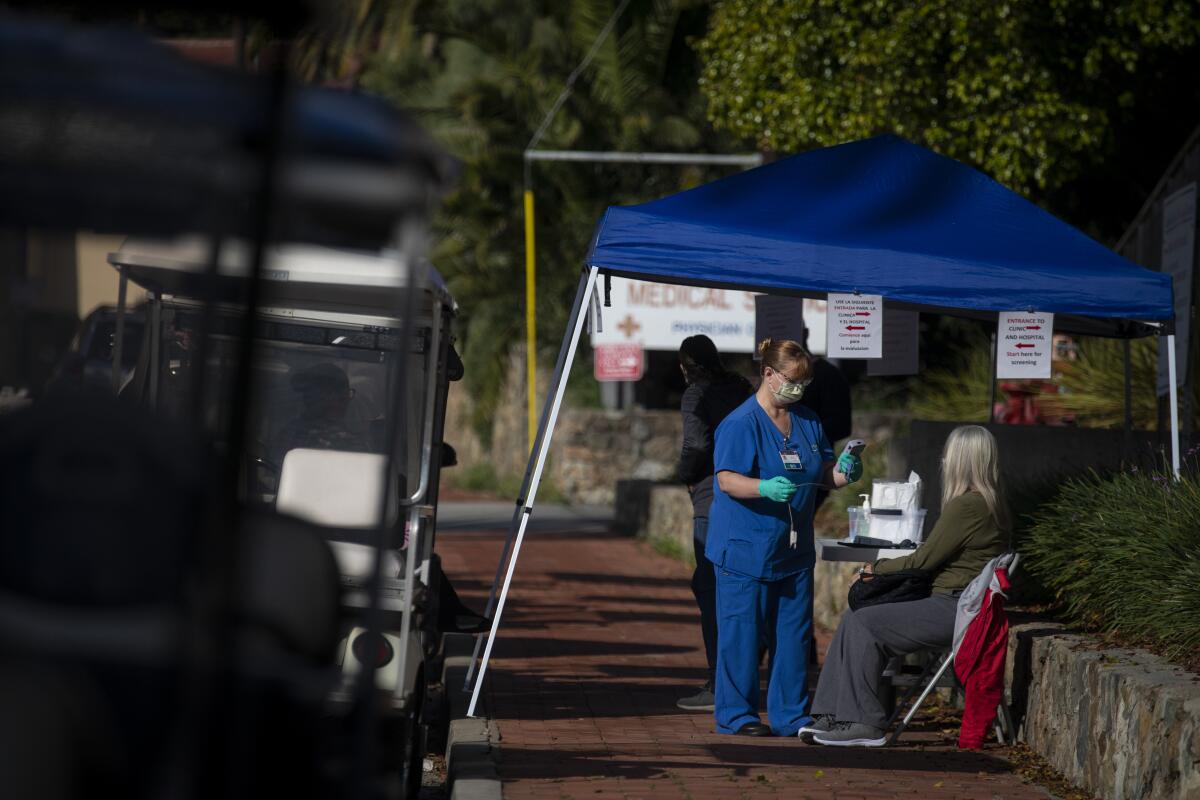
Outside Catalina Island Medical Center, volunteers under a tent asked anyone who had an appointment to fill out a survey asking whether they had recently experienced coughing or a fever. A nurse wearing a gauze mask and stethoscope took the temperature of elderly patients.
“We know our patients personally here,” said Chief Executive Jason Paret as he went off to another conference call. Late last week, he canceled the hospital’s annual health fair.
Mayor Ann Marshall tried to find a silver lining. “As people aren’t coming, it’s creating a natural social distancing,” she said outside City Hall as residents greeted her only to find out it was now open by appointment only. “But my concern is that tourism is our only economy, and it’s going to be impacted.”
Locals tried to pack in some final hurrahs before all bars had to close and restaurants could offer only to-go orders, per guidelines Los Angeles County issued just that morning that were to take effect at midnight.
Drinkers enjoyed lunchtime suds at Marlin Club and watched Trump urge Americans to confront coronavirus together while Lynyrd Skynyrd’s “Gimme Three Steps” blared on the digital jukebox. Few customers wanted to talk to reporters, although a San Diego resident named Steve was overheard boasting that he had received only one flu shot his entire life and “wasn’t afraid.”
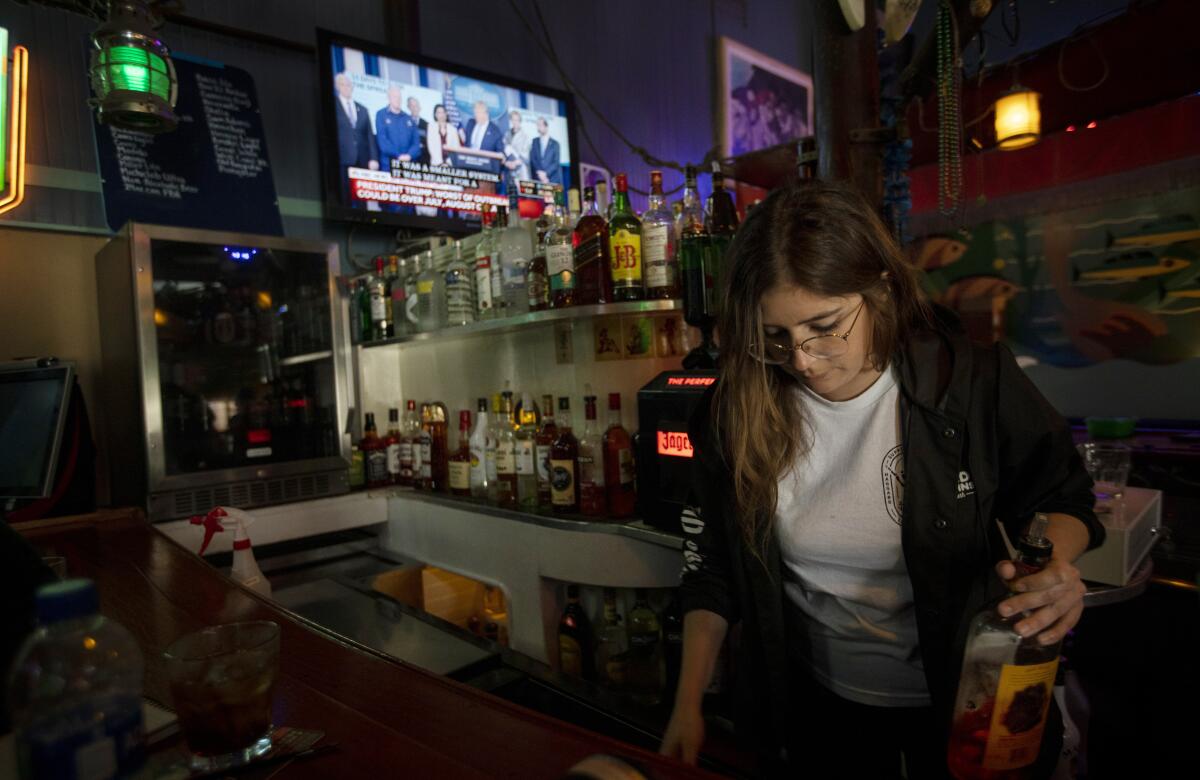
Across the way, the staff at Coyote Joe’s took phone calls from regulars wondering whether it was open. General manager Ricardo Leyva placed a sign outside with a sad face saying to-go orders only. “Better to be careful and start early,” he said.
The few tourists wandering around looked lost, but others took advantage of the light crowds. Samuel Flores of Pico Rivera took the 6 a.m. Catalina Express ride with two friends to celebrate his birthday. His goal for the day: Catch some yellowtail tuna that he could turn into sashimi. Coronavirus was the last thing on their mind.
“We’re young, we’re healthy,” said the 25-year-old, while 23-year-old Norwalk resident Hailey Sniderman dismissed concerns as a media-driven “giant sensation.”
At Avalon’s small public beach, Marco Marroquin enjoyed a mint tea as he watched the waves roll in. He had arrived Sunday from Bakersfield and noted “there was a lot less people on the boat over.”
“I haven’t even gone as far as to think how a drop in visitors is going to affect everyone here,” the 50-year-old said. “It’s just sad. This is just such a special place.”
Later in the day, Matt and Gladys Malouf watched as their toddlers frolicked in the sand. The two had booked their Catalina vacation in December and didn’t want to cancel it. But before leaving their Redlands home, Gladys said she “stocked up a bit because we didn’t know what we’d go back to.”
The couple were one of the few lodgers at their hotel.
“I feel bad for people here,” said Mike as he got off his blanket to help his children dig a makeshift river to the sea. “They can’t just drive off and go find something else to do.”
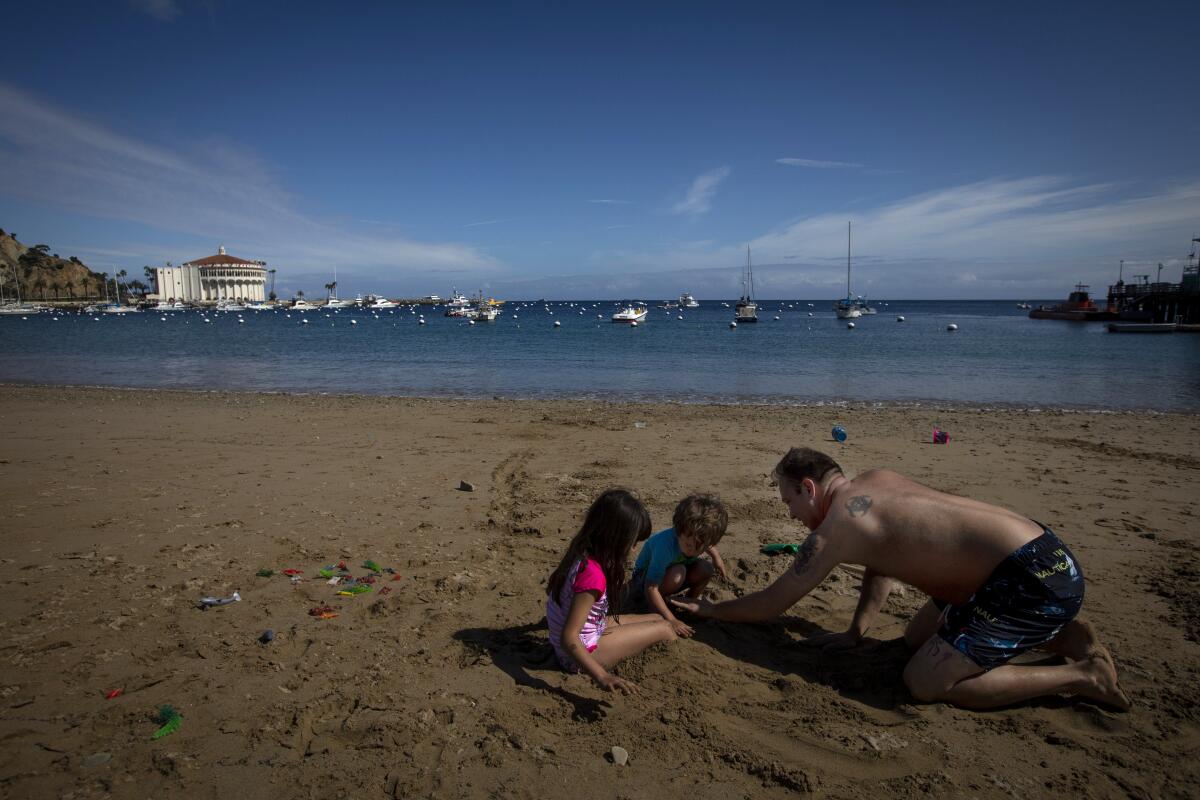
More to Read
Sign up for Essential California
The most important California stories and recommendations in your inbox every morning.
You may occasionally receive promotional content from the Los Angeles Times.
